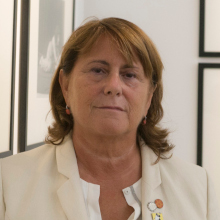Let’s talk about you: what is your background, what do you teach, and what are your research interests?
I was born in Parma and studied in Venice. I teach History of Performing Arts, interpreted in many different ways: as pure history, of course, but also as theatre space, iconography, stage design, museology, direction. And these are also my areas of research, along with Eleonora Duse, Lyda Borelli, Luigi Squarzina, Mischa Scandella, Titina Rota, Santuzza Calì, Paolo Poli, and Max Reinhardt.
Tell us about your academic path.
I came to teaching at university very late. Before that I was an architecture photographer, I travelled a lot: the United States, six months in Australia, India, Europe - from Sweden to Spain and Portugal - I was a freelance and, despite the great difficulties, I loved the job and the freedom it gave me. Then, slowly, my passion for the theatre gave me the opportunity to enter as a visiting professor at Ca' Foscari and for a few years I did both jobs. Then, after my forties, I chose stability, also due to the birth of my wonderful daughter.
What are your professional references?
I have had many mentors that I think of with great nostalgia: Aldo Rossi, who introduced me to the theatrical space; Giovanni Morelli, who helped me explore my love of opera in music; Franco Mancini, who gave me my first experiences in the world of scenography and theatre history; Maria Teresa Muraro and Elena Povoledo, who introduced me to the Giorgio Cini Foundation's Institute for Theatre and Opera, which I now run, trying to continue their projects and invent new ones. Now my references are my older and younger colleagues, who I share many initiatives and research projects with.
What has given you the greatest satisfaction in your career?
As a teacher, I think, the greatest satisfaction is when students become interested in my subjects, when they ask me to expand on something I have said in class or when they ask me to do a dissertation based on the subjects of my courses. Then, of course, when I manage to publish a good book or organise a good exhibition or produce a successful show. Fortunately, I had the chance to direct the Ca' Foscari University Theatre in Santa Marta for 6 years, from 2014 to 2020, and that was a great satisfaction.
The area you have always wanted to be involved in but have not yet had the opportunity to explore?
Actually working in a theatre. Maybe playwriting or stage design, but I am not giving up, perhaps there will be an opportunity in the future!
What are you most passionate about in your research?
Archives, discovering unknown documents, finding relics of old performances and imagining what they must have been like: entering the memory of an art like theatre which is fleeting by nature, that you cannot relive once the curtains close.
Have you always known that this was going to be your path?
No, I would have liked to do a thousand other things, including this of course.
What do teaching and researching mean to you?
I love teaching, communicating my passion for historical research and my desire for discovery.
Can you offer any advice to researchers in the early stages of their career?
I always tell students, who I often see as a bit dull, to follow their instinct, their passion, to love and pursue something and to try to get there with all their heart, even with fatigue and lack of money. I always say that those who study theatre, as we historians do, cannot do it to seek success and wealth, but only because they deeply love it.

